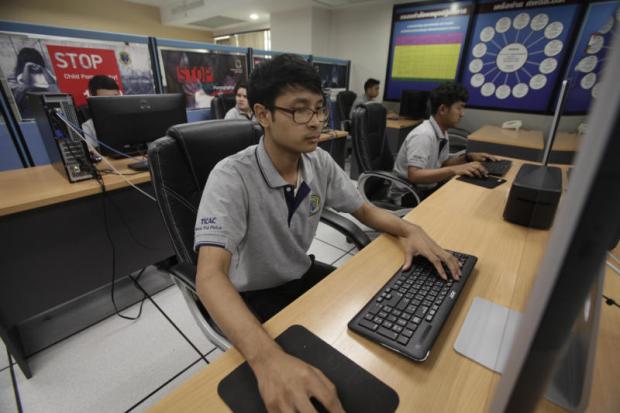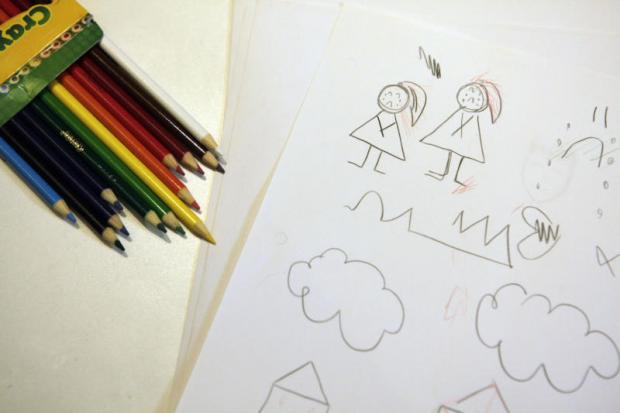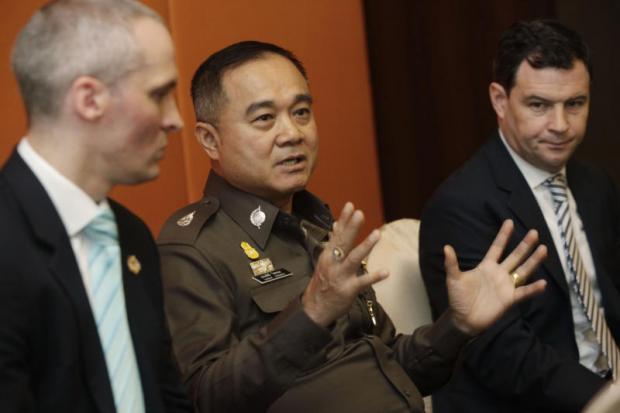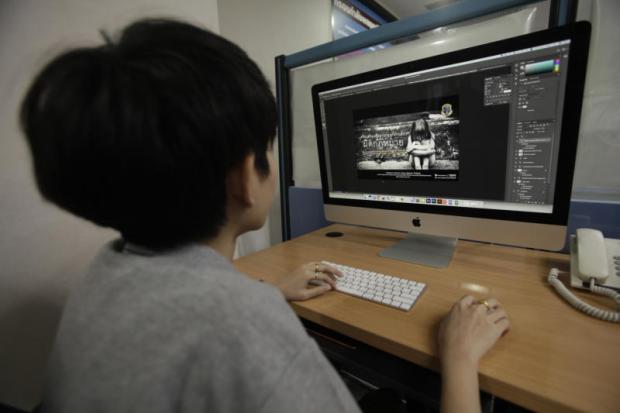
A schoolboy came to the police with a broken heart. He was utterly embarrassed but decided to tell police that a video clip of him masturbating had been distributed online and he wanted it removed.
It transpired that he had fallen in love with a beautiful woman he met on the internet.
They developed their relationship through video live chat, he got carried away and pleasured himself without knowing he was being recorded.
He later found he was the victim of a group of transvestites who stole other people's pictures and created fake identities to lure young men like him in order to blackmail them.
An investigation by the Thailand Internet Crimes Against Children (TICAC) Task Force found over 100 such video clips and dozens of victims.
The task force is expanding its investigation into this case, which happened in a northeastern province. The number of teenage victims is expected to reach 200.
At the same time, in another northeastern province, a similar case is being investigated in which an internet user with the identity of a handsome Thai-Singaporean luk krung seduces women he meets online, claiming to be in love with his victims.
The women, some in their 30s, agreed to prove their real love even if it meant they had to have sex with a stranger as requested by the handsome man online.
"Internet crimes against children are modern crimes happening in a complex environment while the crime scenes are also 'in the cloud'. In this era of the digital economy and digital society, people live in the cloud," said TICAC head Tamasak Wicharaya, also an acting deputy commissioner-general of the Royal Thai Police.
Each year, about 50,000 downloads and uploads of child pornography are detected in the kingdom by the task force. Such acts are now a crime in Thailand.
On Dec 8, 2015, Thailand amended the Criminal Law stipulating penalties for the possession of child pornography as well as transferring or disseminating such material. The penalties include up to five years’ imprisonment and/or a fine of up to 100,000 baht for personal use, and up to seven years’ imprisonment and/or a fine of up to 140,000 baht for commercial use.
A month later, TICAC was set up as an ad hoc agency to tackle internet crimes against children, with the support of Deputy Prime Minister Prawit Wongsuwon in charge of national security and the officers of the Homeland Security Investigations attached to the US embassy in Bangkok.
As of June 29, TICAC had received tip-offs and complaints about 129 incidents, with 36 being investigated. Out of these cases, 24 or 67% involve child pornography, eight or 22% involve child sexual abuse and four cases or 11% involve human trafficking.
About a quarter of the total cases have been concluded. Among the 35 suspects, 29 were arrested, five foreigners were sent back to their own countries and one is pending charges.
RELATED CRIMES
Internet crimes against children, besides damaging the victims, are linked to other problems including human trafficking.
Child porn images can be used to blackmail and force victims to do things against their will. Meanwhile, such material could lead to other sex crimes such as harassment and rape.
Among the cases investigated by TICAC, the youngest victim was four years old. The victim, from an ethnic minority in Chiang Mai's Fang district, was held naked and photographed with the offender, who was also naked. Expert analysts said the pictures could be sexually arousing. If disseminated, they could arouse the viewers to commit sex crimes, Pol Gen Tamasak said.
PREDATORS AND PREY
TICAC keeps an eye on paedophiles, especially foreigners who have a history of child sexual abuse and those with a history of watching or producing child pornography, Pol Gen Tamasak said.
When Thai authorities receive alerts from foreign agencies, such as the National Centre for Missing and Exploited Children, the foreigners will be followed more closely. If they are spotted uploading or downloading porn images, police can request a warrant to search their residence and check their mobile phone and computer. If pornographic material is found, they are subject to a criminal lawsuit.
"Some foreigners portray themselves as a saints providing help and giving sweets to children. Once they gain trust of the children, they find a chance to be alone with them and record the victim being abused, then use the media to threaten and further abuse them," he added.
Meanwhile, TICAC looks after vulnerable children.
"Children from poor families or broken homes are the most vulnerable. Once they fall prey to paedophiles, it is difficult for them to get over the experiences and live in society as normal. They will fall back again as a victim," Pol Gen Tamasak said.
Poor children looking for work sometimes end up in the sex industry. Afterwards, they became subject of porn media which the offenders use to blackmail and force them to continue working in the industry, which is a recurring pattern in many cases, he added.
Children from broken homes who spend a lot of time alone with stepfathers are also at risk. They are usually too frightened to speak out if they are sexually abused, he said.
Reports from Khon Kaen and Nakhon Ratchasima revealed that children who have access to the internet are often lured by paedophiles who groom their victims through online communication.
PREVENTIVE MEASURES
Sex criminals have a higher reoffending rates than other criminals, Eric McLouglin, regional attache of the US Department of Homeland Security, said.
Moreover, just as the criminals have networks to share information and adapt rapidly, authorities have to join hands and get ahead of the criminals and implement preventive measures before new crimes happen, he added.
TICAC, together with its network including NCMEC, detect and locate uploaders and downloaders of pornographic material before going to search, investigate and take legal action against them before they can commit more crimes.
Information from other security agencies also contribute to preventive measures. Last year, after requests to immigration police, 26 Americans were denied entry to Thailand as they had criminal records of child abuse.
"Human trafficking, especially involving children, is the most serious type of crime. The community has a right to know that you are a bad guy. We can locate where you are," Pol Gen Tamasak said. "We are sending a clear message -- Thailand is no longer a safe haven for criminals," said the TICAC chief.
The Federal Bureau of Investigation and the Homeland Security Investigations have organised a training course for police, social workers and non-governmental organisations. (Video by Pornprom Satrabhaya)
INTERNATIONAL COOPERATION
Among the cases concluded by TICAC, of the 129 incidents, information of 88 incidents, or 68%, came from foreign agencies including law enforcement, embassies and NGOs providing information about offenders, victims and the damaged parties.
The FBI and the Homeland Security Investigations (HSI) have vowed to give full support to Thai police to bring wrongdoers to justice if Americans commit crimes in Thailand.
Eight Americans have been prosecuted and several have been repatriated to serve penalties in the US.
There are factors to consider in deciding whether to send the suspects back to their own country or to have them prosecuted in Thailand. Chief among these is the chance of a successful prosecution, said John Schachnovsky, FBI legal attache at the US embassy in Bangkok.
Fighting such crimes needs collaboration from law enforcement officials, social workers and NGOs as well as the private sector, including telecommunication service providers.
The special teams include victim analysts and digital forensic analysts.
THE ROLE OF NGOs
Many times, NGOs are the first to respond to victims.
Mr Schachnovsky, who has been in Thailand for seven years, said many years ago NGOs and the police did not want to work with each other.
"Their attitude was 'we don't need them'," said the FBI officer referring to the situation in the past.
However, they later realised that they needed each other to successfully put the wrongdoers behind bars and protect innocent people. More NGOs are happy to join forces with the law enforcement team.
Wirawan "Boom" Mosby, the 2017 recipient of the US Secretary of State Trafficking in Persons Report Hero Award, is also an active member of TICAC.
The director of the Hope, Understanding and Grace (HUG) project in Chiang Mai has been providing investigative support through fact finding, case coordination and consultations with various law enforcement, social work, NGO and government officials. She also conducts key forensic interviews with child victims of trafficking and sexual abuse.
She also spearheaded the opening of ACT (Advocacy Center For Children Thailand) House, the first such centre in Southeast Asia, which also has branches in Pattaya and Phuket.
"To make further progress, we need to educate and train people how to properly address these issues," Ms Mosby said in an interview with the Bangkok Post.
"Preconceived ideas and misconceptions have to be replaced with the right type of knowledge so that victims will be encouraged to seek help. They have to be told they are not at fault. We need more people with a heart for victims of sexual and domestic violence. It is pivotal to not prejudge their actions."
SPECIAL TRAINING
Information from the victims is the key to success in an investigation, finding the wrongdoers and the prosecution. However, to get such information from victims and witnesses who have been through an ordeal is not easy, and sensitivity must be kept in mind.
"We want the entire story to come from the victim, not from us. Even if we go into the interview knowing a lot of factual information because evidence has been gathered, we still need all that information to come from the victim. And sometimes with younger children, it's a very difficult task to ask them to do that. So we need to make sure that we ask appropriate questions that a child can understand and can relate to and respond," said Crystal Gregory, forensic interview specialist and national programme manager at HSI.
In the case of forced labour in the fisheries industry, police investigation stalled. Despite the evidence and witnesses' accounts, the police failed to get the victims' accounts. A key Cambodian victim lost his memory and refused to say anything as a result of being tortured on a boat.
It took the police and related experts two years of patience and skills to help the victim regain his memory, and then he finally gave information that led to a successful prosecution, Pol Gen Tamasak said.
From July 10-14, the FBI and the HSI as well as the US embassy organised a special training course on forensic interviewing of child and adolescent victims and witnesses for Thai police, social workers and NGOs including HUG from Chiang Mai, A21 from Pattaya and For Freedom International from Phuket.
The course was on different skills and techniques to talk to victims of crimes such as trafficking in persons, child exploitation and forced child labour to ensure that the victims can feel safe and provide a safe environment to talk about the abuse they encountered, said Ms Gregory, one of the trainers.
It also discussed victimisation, the effects of trauma and how a victim can face different problems throughout the process.
The training also included steps to provide a safe environment in a neutral location, and to make sure that during the interview, the interviewers are not blaming the victims, Ms Gregory added.
It was the same 40-hour basic training provided to the American investigation teams.
The failure to properly interview victims will not only jeopardise the legal case but can also ruin the lives of the victims, especially when they are children, said the Department of Homeland Security's Mr McLouglin.
Interviewing the victims of human trafficking and other forms of exploitation must be based on the principle of a victim-centric approach, he added.
"The interviewers need the skills and interview techniques to make sure that the victims are not re-victimised, and they must be interviewed in a safe place. Otherwise, they might see investigators as bad people and will not open up," Mr McLouglin said.
Mr Schachnovsky said the interview must be in a friendly environment, not where uniformed police are walking around.
Children's advocacy centres, currently available in Chiang Mai, Pattaya and Phuket, are examples of a suitable interview environment.
The interviewer and the victim have a one-to-one interview in a room, which other investigators can watch from another room via video.
"We must keep in mind that the victims must be able to go back into society. Every part of the investigation is very important. If it fails, it will hurt the victims for their whole life," Mr Schachnovsky said.
The group hopes to set the victim-centric approach as the standard for interviews.
BUILDING TRUST, EXPANDING FORCES
While Mr Schachnovsky praised the efficiency and effectiveness that TICAC has shown through its success in less than two years, Pol Gen Tamasak pointed out that it was a small team of committed people who understand each other.
Meanwhile, it has gained understanding and assistance from police from different departments.
They have to strengthen trust and regularly check among themselves to make sure that they are free from bad influences caused by the traumatic nature of their work.
He hopes that the cooperation with NGOs can expand and more children's advocacy centres can be set up in Bangkok, Nakhon Ratchasima, Khon Kaen, Nakhon Pathom and Songkhla in the near future.
TICAC currently has 40 officials from many departments of the Royal Thai Police. It is in the process of recruiting 130 more, Pol Gen Tamasak said.
For video please visit www.bangkokpost.com

WATCHDOG: Staff of the TICAC Task Force check social media and online news every day to spot any content that poses threats to children. Pornprom Satrabhaya

GENTLE TOUCH: Coloured pencils and paper are common props to keep young victims relaxed so that the interviewer can make progress. Pornprom Satrabhaya

DIFFICULT TASK: Crystal Gregory says interviewers must be sensitive. Pornprom Satrabhaya

CRIMEFIGHTERS: From left, Eric McLouglin, Tamasak Wicharaya and John Schachnovsky work together to combat online crime against children. PHOTOS: Pornprom Satrabhaya

EASY PREY: Curious children can easily become targets for online abuse.

PHOTOS: 123RF